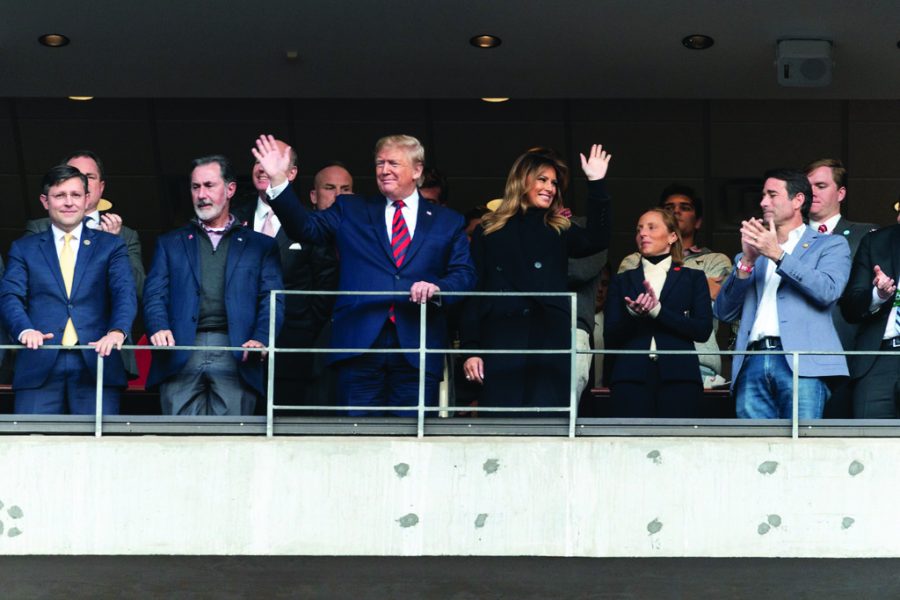Whistleblower agrees to answer questions
Public opinion on Trump has wavered in light of the impeachment proceedings. Trump was booed by fans at a World Series game, met with a mixed response at a martial arts fight, and was cheered for at the Alabama-Louisiana college football game that occurred on Nov. 9. The president and first lady garnered enthusiastic welcomes at the Bryant-Denny stadium.
On July 25, 2019, President Trump had a call with Ukrainian President Volodymyr Zelensky. During their correspondence, Trump reportedly pressured Zelensky to give up information on political rivals for the United States to give aid and support in a quid pro quo exchange.
Details on the conversation were leaked to the media by an anonymous whistleblower. If the alleged statements are true, then Trump may have committed an impeachable offense. As a result, many are questioning the identity of the whistleblower, who had been declining answering further inquiries until recently.
The whistleblower who sparked the Trump-Ukraine scandal inferno has offered to answer written questions from Republican congressmen. This offer was made on Sunday, Nov. 3, after President Trump called for the whistleblower to identify himself.
The offer came after numerous complaints from Republican lawmakers and President Trump that the investigation process was veiled and unfair. The whistleblower made numerous accusations about President Trump, but no one knows if the whistleblower is a credible source, and no one could question his claims because of anonymity.
On Tuesday, Sept. 29, 2019, Trump showed his frustration on social media.
Trump tweeted, “Like every American, I deserve to meet my accuser, especially when this accuser, the so-called ‘Whistleblower,’ represented a perfect conversation with a foreign leader in a totally inaccurate and fraudulent way.”
Mark Zaid, the whistleblower’s attorney, asserts that the whistleblower must remain anonymous. Zaid believes that the whistleblower and his family could be physically harmed if his true identity is released.
Zaid told Yahoo News, “My legal career has been spent fighting to uphold First Amendment protections, but sadly, many do not realize that the Constitution does not give them the right to harass or threaten private citizens.”
According to NPR, Zaid made the offer to the House Intelligence Committee to allow direct communication between the whistleblower and Republicans. The questions will be written to maintain the whistleblower’s anonymity. However, the process is all under oath, meaning there can be serious repercussions for giving untruthful answers.
Although this controversial issue seems to walk a party line, Zaid emphasized that the whistleblower’s complaint should be handled in a non-partisan way.
“Being a whistleblower is not a partisan job nor is impeachment an objective,” Zaid said in a press release with CNN.
House Intelligence Board Chairman Adam Schiff and a representative from California’s 28th district further emphasized the importance of anonymity.
“They have the right to remain anonymous,” Schiff said in a statement to CNN. “They certainly should not be subject to these kind of vicious attacks and other words and actions that threaten their safety for doing their patriotic duty.”
President Trump was dissatisfied with the offer to answer written questions. He announced that he wanted the whistleblower to identify himself and openly testify.
“He must be brought forward to testify. Written answers not acceptable!” Trump tweeted.
Republican Rep. Jim Jordan agreed with the President. Jordan is on the House Oversight Committee and made remarks about the written question process.
“Written answers will not provide a sufficient opportunity to probe all the relevant facts and cross examine the so-called whistleblower,” Jordan said according to CNN. “You don’t get to ignite an impeachment effort and never account for your actions and role in orchestrating it.”
Editor’s note: This story originally was published in Volume 106, Issue 6 of The Guilfordian on Nov. 15 2019.











